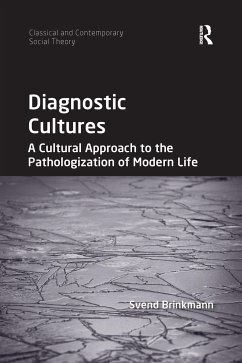Some studies estimate that each year, around a quarter of the population of Western countries will suffer from at least one mental disorder. Should this be interpreted as evidence for the progress of psychiatry, a discipline that is now able to identify and treat mental illnesses that have always existed, or might it be the case that modern life somehow creates new conditions, or social pathologies? This book argues that in fact something more fundamental has been taking place in recent years: the development of diagnostic cultures. Taking account of the phenomenon of patients themselves 'pushing for' pathologization - and acknowledging therefore that this is not simply a case of psychiatry pursuing an agenda of 'medicalisation from above' - this volume examines the emerging trend towards interpreting our sufferings in terms of psychiatric conceptions and diagnostic categories. Drawing on new empirical case studies of psychological diagnoses, including depression and ADHD, and employing both cultural-psychological and sociological analyses, it charts the development of contemporary diagnostic cultures and asks whether, in transforming existential, moral and political concerns into individual psychiatric disorders, we risk losing sight of the larger historical and social forces that affect our lives. A ground-breaking examination of the shift towards the pathologization of suffering and the dangers that this presents to human self-understanding, Diagnostic Cultures will be of interest to scholars of social theory and philosophy, the sociology of culture, psychology and the sociology health and medicine.
Bitte wählen Sie Ihr Anliegen aus.
Rechnungen
Retourenschein anfordern
Bestellstatus
Storno








